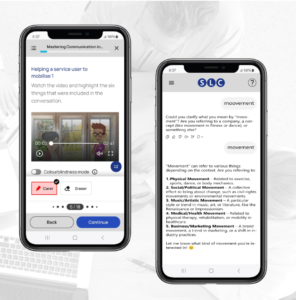
SLC win Ufi grant to develop AI language learning app for social carers
We’re delighted to have won a grant from Ufi VocTech Trust to develop an AI-driven technology solution that provides cheap phone-based language and communication skills

Is the English language an incredibly difficult one to learn? You tell us. Here at SLC we have students enrolling in our courses that come from all over the world, and one of the many countries that we recruit our nurses from is that of the “bella Italia”. Now, one may ask whether it is easy to switch off one language and immerse oneself in to another, and the answer to that question is no. In fact, there are many difficult aspects that are common among most learners.
1. Vocabulary
Both English and Italian derive from Latin. This facilitates the learning of new words, however it also creates the inevitable language trap of “false friends” among European languages. An article in MED Magazine lists both adverbs and adjectives that can be very deceptive, for example morbido (soft)/ morbid( a subject that is disturbing and unpleasant); bravo (good/clever) / brave(courageous); editore (publisher) / editor(the person in charge of the final content of a magazine, article, or book); fame (hunger) / fame(when someone becomes very well-known); and many more, which as it is clear from their aesthetics, can be very confusing.
2. Pronunciation
Just as most English students find it incredibly difficult to pronounce the letter “r” when learning Italian or Spanish, Italian students find the same difficulty in pronouncing the infamous “th”. This is simply the case of it not being present at all in their own language, so why would they know how to? For example, the word “thanks” turns in to “tanks”, and the number “three” turns in to “tree”. Moreover, there are other letters that students struggle to pronounce, such as the letter “h” (i.e. in words like “honour” and “hungry”), this is because Italians also have words that begin with “h”, such as “hanno” (they have), but they simply don’t pronounce it, ever. It can be confused with the word “anno”, which, instead, means “year”. Languages can be quite a challenge sometimes!
3. Translation
Italian students have the tendency to slip Italian-isms in to their sentences, for example, when wishing someone to have a good day at work, they would say “have good work”, which is the literal translation of the Italian “buon lavoro”. Additionally, there are other typical phrases such as “you have reason”, from the italian “hai ragione”, which put correctly would mean “you are right”.
These 3 aspects were thought of by Kristina Saxelby, a bilingual member of our Operations Team here at SLC. However, they are just 3 out of 1000 encountered by Italian students when learning the English language.
But what about you? What other difficulties do you encounter whilst learning English? Whether it be from an Italian, Spanish, or Indian language perspective, we would love to know!
SLC’s ground-breaking online Medical English courses gives you the language you need to work, study and collaborate in an English-speaking environment.
Just click on the course and start your Medical English preparation!
In Specialist Language Courses we offer free lesson plans to teachers so they can have the best materials to teach their students about Medical English.
You can subscribe to our newsletter where you will receive monthly email with the latest materials that SLC offers for free.

We also offer the latest in online medical English resources and materials to transform your teaching programmes and accelerate your students’ learning.
Teachers and institutions use the courses in multiple ways – as digital coursebooks, as supplementary learning, and as part of a flipped classroom approach. We can advise you how to integrate the materials to meet your objectives.
Interested in using our courses? Click here:
Get updates and get the latest materials on Medical English, OET and IELTS

We’re delighted to have won a grant from Ufi VocTech Trust to develop an AI-driven technology solution that provides cheap phone-based language and communication skills

We’re delighted to announce a partnership with leading Medical English app, Doxa.
